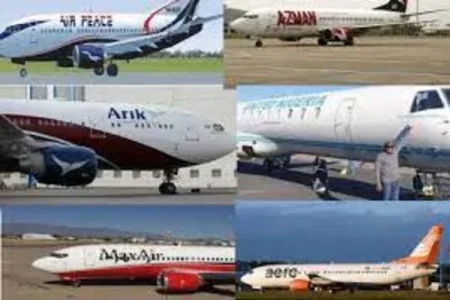
Nigerian airline operators have sounded the alarm over a waning passion for business continuity amid the relentless challenges posed by escalating aviation fuel costs and a foreign exchange crisis. The spokesperson for local air carriers, Obiora Okonkwo, issued a compelling statement, emphasizing the critical need for governmental intervention to prevent the potential downfall of the nation's domestic airlines.
The aviation industry is currently grappling with the harsh realities of unpredictable fluctuations in foreign exchange rates and the skyrocketing price of aviation fuel, currently priced at an astonishing N1,300 per litre. These economic hurdles have severely hampered strategic planning and operational stability within the sector.
Okonkwo, who also presides over United Nigeria Airlines, highlighted the detrimental impact of the abrupt rise in aviation fuel costs from N700 per litre, coupled with the surge in the exchange rate to 1,400/$. The consequences are felt keenly as airlines find themselves servicing passengers who booked flights at prior rates, now faced with the burden of elevated costs, thereby exacerbating revenue losses.
The foreign exchange crisis further compounds the industry's challenges, with the nation grappling with a dollar shortage exacerbated by diminished oil production—a critical foreign exchange earner. This scarcity has complicated the ability of local airlines to secure sufficient foreign currency for overseas fleet maintenance and checks.
Okonkwo shed light on the multifaceted challenges confronting the sector, including dollar scarcity and increased operational costs due to hikes in service charges by handling companies, airports, and maintenance service providers. He lamented the financial strain on passengers, who bear the brunt of these escalated costs, diminishing the airlines' revenue streams.
Moreover, Okonkwo pointed out the adverse effects of the economic downturn on passenger traffic, attributing the decline to reduced discretionary spending among potential travelers, thereby impacting the airlines' ability to maintain viable load factors during the low season.
"We are making losses on factors that are beyond our control," Okonkwo stated. "Handling companies have increased the cost of their services, airports have increased their charges and those that service the aircraft have also increased the cost of their services. The monies for these payments are coming from the passengers who are already exhausted financially."
The challenges have now reached a critical juncture, eroding the airlines' determination to persist in the business. Some carriers are perilously close to an operational shutdown, with Okonkwo emphasizing the dire financial straits of airlines struggling to meet lease payments amidst dwindling revenues.
"Our passion to remain in this business is being eroded. We are at the point of oxygen supply. Some airlines are going into a coma. Our equipment is diminishing," Okonkwo warned. He also highlighted the difficulty of expanding fleets under current conditions, citing the apprehension of aircraft lessors towards country-specific risks, which often outweigh the airlines' compliance with operational standards.
As the passion for business wanes, the fate of Nigerian airlines hangs in the balance, with the industry desperately seeking a lifeline to navigate these turbulent skies.
Source: Nairametrics




